If there is one thing I would change in our unchangeable Orthodox Church, it would be to add an Old Testament reading to Divine Liturgy. Its absence means that most Orthodox never hear Genesis, the story of the Beginning of Everything – and much other important material. If we don’t get the foundation right, the whole house will be unsteady.
Make it two things: Nor do we hear the magnificent conclusion to the book of Revelation – the End of all things. I quote this every so often in preaching (it will be in the next Post), and it is so beautiful, filled with so much hope and longing, that I always get teary eyed and find it hard to get through it.
The Creed gives us a quick summary of Everything. Our appointed daily Scripture readings cover much more, but only in little snippets. Rarely do we get it all at once, the big picture of what Everything is all about.
So today, as we approach the celebration of the most important event in history, let’s give it a try. We’ll have to omit a few details – the Babylonian Empire, Noah, Constantine the Great, Atilla the Hun (one of my own German ancestors), the Middle Ages, the Enlightenment, the Spanish Inquisition, the invention of the printing press, the Vietnam War, Donald Trump and a couple of other things. But we’ll hit the essentials.
So… hang on. Here we go!
The Beginning
“In the beginning God created the heavens and the earth.” Genesis 1:1 We’ll spend a lot of time on this, for the early chapters of Genesis tell us profound things about the state of the world and mankind.
The Creation story, as understood by the Church, makes these points:
1 Before 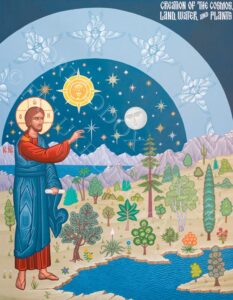 the beginning of the cosmos was God, “the Maker of heaven and earth”. He created the beginning. All that exists, even time, came from him. It all belongs to him. We belong to him. If we think we can be independent and do whatever we want to ourselves and to his creation, if we think we can get it together apart from him, we’re not in touch with Reality.
the beginning of the cosmos was God, “the Maker of heaven and earth”. He created the beginning. All that exists, even time, came from him. It all belongs to him. We belong to him. If we think we can be independent and do whatever we want to ourselves and to his creation, if we think we can get it together apart from him, we’re not in touch with Reality.
photo from Saint Nicholas Church, Cedarburg WI
2 All he created was good. The Hebrew word for good, “tob“, also means beautiful. He made all things good and beautiful, and man and woman are the crown of creation, for when he saw us God said “This is very good, very beautiful.”
3 Something happened to make the world what it is today: this bizarre combination of good and evil, beautiful and ugly. Each of us human beings is now both very good and very evil, very beautiful and very ugly. Genesis says that though we are made in the image (or icon – it’s the same word) of God, we icons have become defaced, tarnished. Genesis says what uglified us came from outside: from the serpent, later identified as Satan, God’s adversary, who is out to ruin God’s good beautiful creation. This means that the mess we are in is not entirely our fault, but neither is it true to say “the devil made me do it”. We also choose evil, do we not? The serpent offered the forbidden fruit, but Eve and Adam took it, did they not?
Mankind after the Fall into Sin
So we lost our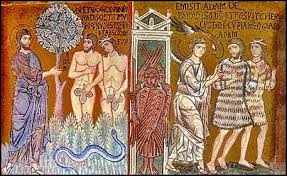 innocent happiness, our natural union with God – that is, the Garden. Now we’re outside the garden of natural innocence, and we can’t get back in. God has “stationed cherubim to the east of the Garden of Eden, with a whirling sword of flame to guard the way to the tree of life.” Genesis 3:24 No matter how hard we try, “we can’t go home again”.
innocent happiness, our natural union with God – that is, the Garden. Now we’re outside the garden of natural innocence, and we can’t get back in. God has “stationed cherubim to the east of the Garden of Eden, with a whirling sword of flame to guard the way to the tree of life.” Genesis 3:24 No matter how hard we try, “we can’t go home again”.
Remember: Sin in New Testament Greek means “missing the mark”. The mark was God and his love. When we got separated from God we began to die. Please do not get confused about this. One brand of Christianity has taught that this was God’s legal condemnation, his curse on us – as if God the Judge had said, “You have broken my law? Then Die! Go to Hell! I condemn you to everlasting torment!” Did the author of Genesis see it that way?
Even if so, no matter, for Jesus Christ, the ultimate revelation of God, came to show us that God our Father is not like that. No: Christ came “not to condemn the world, but that the world through him might be saved.” “This is the message we have heard from him and declare to you: God is light; in him there is no darkness at all.” 1 John 1:5 As the priest says at the end of almost every Orthodox service, our God “is good and loves mankind”. Good loving fathers do not condemn disobedient children to eternal torment. We die not as punishment, but because God is life, the Source of life, and if we are not united with him we go dead. That is our problem.
That is the foundation laid by Genesis.
History
And so began history as we know it, this strange condition where we are forever aware that the world is not what it ought to be, that we are not what we ought to be. We know something is desperately wrong, but we don’t know quite what it is or how to fix it, and no matter how hard we try we can’t seem to get it right. (We can’t get back into Eden.) And in the end we die – and we all know that death is just wrong. Each person, every living creature struggles to keep living. That is because God created us to live, not to die. Something has gone terribly wrong with the whole creation.
Many of the Fathers said God never intended us to stay in Eden. One of my professors pointed out that the Bible is the story of mankind’s progression from the Garden in Genesis to the Heavenly City at the end of the book of Revelation. We’re all on a journey from natural innocent happiness towards community, consciously united in love. There is no room for self-centered individualism here. We’re headed towards a city, a community, a fellowship of love. God always intended us to take this journey, with Christ our God leading us every step of the way into fullness of life, love and joy. But we made a dreadful detour away from him towards misery and death. Mankind as a whole is still in the ditch. Look at the news. Look at us.
Why did God allow this to happen? We are not told, and there’s not much use speculating. If we needed to know, Christ would have told us. The Lord Jesus said only “An enemy has done this.” Why doesn’t God just wipe out evil? Jesus said it’s because wheat and weeds are now intermingled.  There is evil within us; to destroy it would destroy us too, and God won’t do that. So good and evil must grow together till the harvest. Matthew 13:24-30 Aren’t the thistles in the field pretty? But they’re prickly, and let them go and they’ll take over. That’s why my grandfather, a farmer of long ago, would go and carefully pull the weeds out one by one, before it was too late. Can we learn something from him?
There is evil within us; to destroy it would destroy us too, and God won’t do that. So good and evil must grow together till the harvest. Matthew 13:24-30 Aren’t the thistles in the field pretty? But they’re prickly, and let them go and they’ll take over. That’s why my grandfather, a farmer of long ago, would go and carefully pull the weeds out one by one, before it was too late. Can we learn something from him?
Why doesn’t God just force us to be good again? Because that would destroy our free will, our freedom to choose. That would ruin everything, because God’s plan is to make us into beings like himself who freely choose goodness and love and who therefore know joy like his. Robots don’t know joy; they just function. So God now must rescue us one by one, and join us to the Church – his people who are on the road again, moving ahead toward his Kingdom. And that brings us to…
God’s Chosen People
Now we’ll move faster. The rest of the Old Testament tells how God worked to get us to choose right, get us on the road again. And for us Christians, essential history now narrows down to one people, the Jews. This is in fact the story of the beginnings of God’s Church.
No matter what we think of modern Zionism (and I know what I think), the Old Testament Jews are our ancestors in faith; that is why we Orthodox celebrate them on the Sundays before Christmas.
The Jews were unique. When all other peoples believed in many gods, their lives therefore torn in all directions, when the great Greek philosophers were just realizing there must be one unifying force within the universe, the little tribe of Jews had long known that there is one God who created the universe. And long before anyone else, the Jews knew what God wants of us: right living: “You shall love your neighbor as yourself”. Leviticus 19:17 They knew that when we fail he wants not sacrifices but repentance, hearts and lives turned back to him and to goodness. “You delight not in burnt offerings. The sacrifices of God are a broken spirit: a broken and contrite heart, O God, you will not despise.” Psalm 50 (51) which we read daily in church.
How did the Jews all 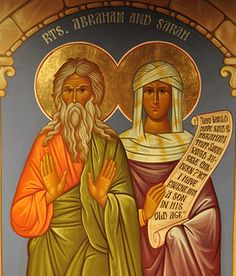 know this? Their only explanation: God told us, God revealed himself to us. Starting with Abraham and Sarah he called a people to himself, to know him, obey him, be the pattern of how mankind can be put on the right path again. He promised Abraham that he would become “father of many nations” Genesis 17, and amazingly that is just what has happened. The proclamation of this little tribe of Jews, “Hear O Israel, the Lord your God is one”, is now the faith of 3.5 billion people in the world: Christians, Muslims and Jews.
know this? Their only explanation: God told us, God revealed himself to us. Starting with Abraham and Sarah he called a people to himself, to know him, obey him, be the pattern of how mankind can be put on the right path again. He promised Abraham that he would become “father of many nations” Genesis 17, and amazingly that is just what has happened. The proclamation of this little tribe of Jews, “Hear O Israel, the Lord your God is one”, is now the faith of 3.5 billion people in the world: Christians, Muslims and Jews.
Some Jewish wise men have said that God called everyone but only Abraham answered. Perhaps. Certainly God works in all peoples; all the world is his, and wherever there is love, truth, goodness and beauty God is there. We should never disparage what is good in other religions. Nor should we ever disparage the Jews as a people. We know our God only because of the Jews and their faith in one universal Creator. Circumstantial evidence alone says the Jews were God’s chosen people. How else to explain them?
From the Jews came also the idea that history was going somewhere. Other ancient peoples saw history as a circle: things change but what went around comes around. The Jews saw history as a straight line – now a bumpy weavy line, granted – but headed towards the Kingdom of God.
The Messiah
The Jews were therefore an expectant people, as time went on expecting above all the coming of One sent from God who would set the world right again and lead us into the Kingdom. In Hebrew he is “the Messiah”, in Greek “o Christos – ο Χρήστος, in English 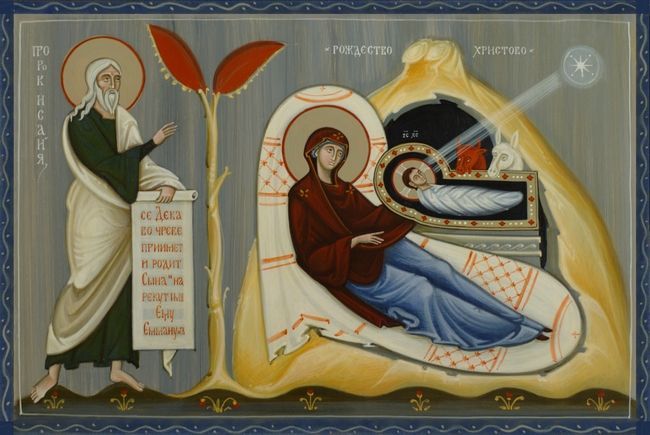 the Christ, the Anointed One. Kings and priests were anointed. He would be true King who would rule in justice, true Priest who would unite God and mankind, heaven and earth again.
the Christ, the Anointed One. Kings and priests were anointed. He would be true King who would rule in justice, true Priest who would unite God and mankind, heaven and earth again.
The Old Testament is filled with prophecies of his coming. We hear some of these at the Christmas Eve Vesperal Divine Liturgy. Mysterious prophecies not at all clear to the Jews at the time (Left: Isaiah 7:14 “A Virgin shall conceive…”) but after his resurrection Christ explained how they referred to himself. Then the Apostles understood.
And so on Pentecost they emerged preaching the Old Testament, the Jewish holy book. Peter began, quoting the prophet Joel: “And it shall come to pass in the last days, says God, that I will pour out of My Spirit on all flesh…” Acts 3:17 Peter then proclaimed Christ’s resurrection by quoting David in Psalm 16 who wrote:”‘Moreover my flesh also will rest in hope. For You will not leave my soul in Hades, Nor will You allow Your Anointed One to see corruption. You have made known to me the ways of life; You will make me full of joy in Your presence.’ Men and brethren, let me 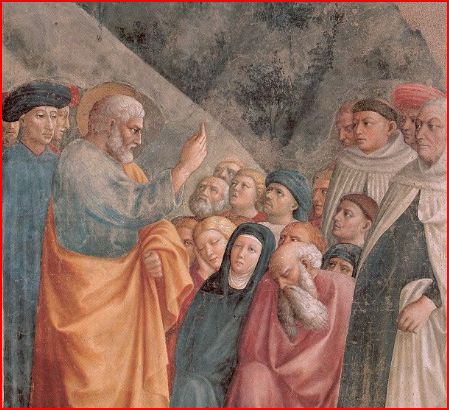 speak freely to you of the patriarch David, that he is both dead and buried, and his tomb is with us to this day. Therefore, being a prophet, and foreseeing this, he spoke concerning the resurrection of the Christ, that His soul was not left in Hades, nor did His flesh see corruption. This Jesus God has raised up, of which we are all witnesses.” Acts 2:27-32
speak freely to you of the patriarch David, that he is both dead and buried, and his tomb is with us to this day. Therefore, being a prophet, and foreseeing this, he spoke concerning the resurrection of the Christ, that His soul was not left in Hades, nor did His flesh see corruption. This Jesus God has raised up, of which we are all witnesses.” Acts 2:27-32
The Apostles proclaimed that to those who had ears to hear it was all there. The ancient forefathers had prepared his way, had foreseen his Virgin Birth, his ministry, his rejection, his suffering, death and resurrection, the coming of the Holy Spirit and his eternal Kingdom.
Looking back the whole Old Testament now looked like a preparation for Jesus Christ, and that is how we Orthodox use the Old Testament liturgically to this day, as a commentary on Jesus Christ, the coming of God into the world.
And so he came.
P.S. Dear brothers and sisters, God grant you a blessed, happy, holy, peaceful feast of the Nativity of our Lord, God and Savior Jesus Christ.
Christ is born! Glorify him!
Next Week: “Everything” Part 2
Week after Next: Back to the “Seven Deadly” – the Sin of Anger. Behave yourself over Christmas, so it won’t apply to you!

Thank you Fr. Bill. I thoroughly enjoyed this history lesson! The most meaningful one, as you say, “we approach the celebration of the most important event in history”. Years ago I read a similar statement which said something like “…and it was so important that it split time in half…BC and AD.”! Of coarse that could not be tolerated in our era of ‘toleration’, so they came up with BCE and CE. I still use the former!
A very blessed feast of the Nativity to you too, Father.
Amen…Christ is Born! Glorify Him!
I still use AD and BC, too. However, no matter what they call it these days, it still divides history in two by the time of Christ’s appearance!
“The proclamation of this little tribe of Jews, “Hear O Israel, the Lord your God is one”, is now the faith of 3.5 billion people in the world: Christians, Muslims and Jews.” Fr. Bill could you expand on what you are saying with this sentence? My understanding is that the Muslims and Jews only accept Jesus Christ as a prophet and not as the son of God and Savior of the world.
Allen, you’re correct: Jews and Muslims definitely do not believe in Jesus as Lord God Incarnate. Muslims consider him the greatest of the prophets before Mohammed. Jews, I think, just ignore him. I was saying only that Christians, Muslims and Jews all believe in one Creator God. That is, all three of us are “monotheistic”. However, we would say that because they don’t believe in Christ who is the ultimate revelation of God, their understanding of the one God is seriously inadequate, to put it mildly.